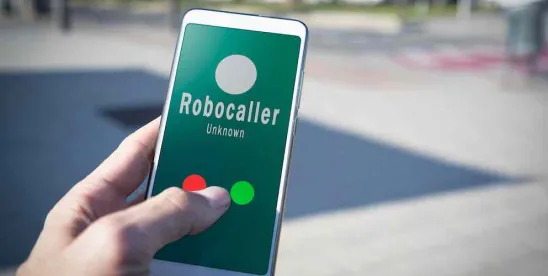FCC Adopts Rules for Private Entity Robocall Reporting and Releases Second Call Blocking Report
The FCC adopted rules establishing a new reporting system for private entities to alert the FCC Enforcement Bureau directly of suspected robocalling and spoofing campaigns. As we reported in June, the new online portal was established pursuant to a directive in the TRACED Act to streamline the ways in which a private entity may share information related to unlawful robocalls and caller ID spoofing. The Enforcement Bureau may use the information submitted to the portal to open investigations or work with partners like the Traceback Consortium to stop robocalling campaigns quickly.
Additionally, the Consumer and Governmental Affairs Bureau (“CGB”) issued its Second Robocall Blocking Report. In the Report, CGB noted that the call blocking and labelling services offered to customers have improved both in quality and quantity. Further, the Report noted that voice service providers and analytics companies report few false positives (calls that are incorrectly identified as being spam or fraudulent, and then blocked in error). Although, in spite of clear progress overall, the Report concludes that robocalling remains a serious problem for consumers. Acting Chairwoman Rosenworcel applauded the Report’s findings saying, “I’m encouraged to see the increasing availability of robocall blocking tools for consumers . . . we have to put consumers first, and it’s in everyone’s best interest to get these junk calls off our networks. I will continue to push industry under the law to make these tools free and easily available to the public.”
Strong Support for USTelecom to Remain Leader of Registered Traceback Consortium
Pursuant to the Pallone-Thune Telephone Robocall Abuse Criminal Enforcement and Deterrence Act (“TRACED Act”) and FCC rules, the FCC must annually select a single registered consortium that conducts private-led efforts to trace back the origin of suspected unlawful robocalls. Since July 27, 2020, the USTelecom Industry Traceback Group has been designated as the registered traceback consortium. However, each year other interested parties may submit letters of intent to be designated as the registered consortium.
ZipDX submitted a letter of intent to be designated as the registered consortium. The Enforcement Bureau invited comment on its submission, and the potential continuation of USTelecom as the registered consortium. Several commenters participated, with many of those supporting the USTelecom-led group maintaining its current designation. Those supporting USTelecom noted in particular its technical, legal and policy expertise, as well as the group’s effectiveness in engaging the telecommunications industry and government regulators to fight illegal robocalls.
The Bureau will select the registered consortium by August 25, 2021.
STIR/SHAKEN and Robocall Mitigation Database Implementation Take Effect
America’s largest voice service providers are now using STIR/SHAKEN caller ID authentication standards on their Internet Protocol (“IP”) networks. Pursuant to the FCC’s March 2020 Report and Order (summarized here), as of July 1, all voice service providers and intermediate service providers not subject to an extension were required to implement the STIR/SHAKEN call authentication framework within their IP networks. Those providers whose networks were previously non-IP based were required to either upgrade to implement STIR/SHAKEN or develop some other non-IP based robocall mitigation program. Voice service providers and intermediate providers had to certify that they were STIR/SHAKEN compliant or had a robocall mitigation plan in place, through FCC’s Robocall Mitigation Database, also no later than June 30. Those that failed to certify may face FCC enforcement action including a possible monetary forfeiture.
Acting FCC Chairwoman Jessica Rosenworcel noted the passage of the implementation deadline stating, “At last, STIR/SHAKEN standards are a widely used reality in American phone networks. While there is no silver bullet in the endless fight against scammers, STIR/SHAKEN will turbo-charge many of the tools we use in our fight against robocalls . . . . This is a good day for American consumers who – like all of us – are sick and tired of illegal spoofed robocalls.”
Former Senate Candidate Seeks Declaratory Ruling on Ringless Voicemail
Perdue for Senate, Inc., the Senate campaign committee for former U.S. Senator David Perdue (R-GA), petitioned the Federal Communications Commission (“FCC”) to issue a declaratory ruling asking the agency to clarify that delivering a voice message directly to a voicemail box through ringless voicemail (“RVM”) technology does not constitute a “call” under the Telephone Consumer Protection Act (“TCPA”) or FCC rules.
In its Petition, Perdue for Senate argues that RVM technology is outside the scope of the TCPA and FCC prohibitions because RVM technology “does not make a ‘call’ to any telephone number assigned to a paging service, cellular telephone service or specialized mobile radio service or any other common carrier service;” RVM transmissions are not the functional equivalent of a call under the TCPA; RVM technology does not use wireless networks to send messages; and recipients are not billed for RVM messages. Perdue for Senate also argues that RVM messages do not “result in the same annoyance to consumers as traditional phone calls” since the recipient’s phone does not ring. Finally, the Petition notes that that RVM technology promotes non-profit “get-out-the-vote” efforts and can provide important election messages to potential voters without implicating the same privacy concerns as telemarketing calls.
Perdue for Senate is not the first entity to seek a Declaratory Ruling from the FCC on this issue. VoAPPs, Inc. in 2014 and All About the Message, LLC in 2017 each filed Petitions for Declaratory Ruling asking the FCC to declare that RVM transmissions do not violate the TCPA or Commission rules. In both instances the companies withdrew their petitions before the FCC ruled on them. Thus, as Perdue for Senate points out, this question remains open.
The FCC may request comment on the Petition but has not yet done so.





 />i
/>i

